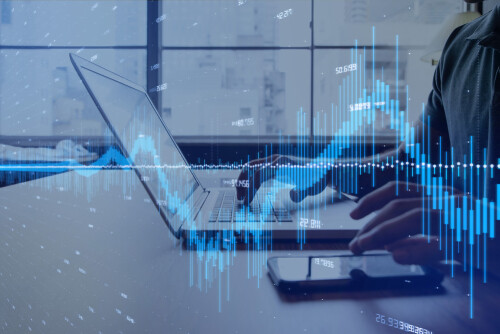It is no longer a secret that Big Data has left a major footprint on the financial market and has changed the way we interact with financial institutions. However, its influence goes much farther. Trading, which is an field that welcomes change and adopts disruptive innovations early, now also benefits from the ramifications of Big Data and is transforming to the benefit of both parties involved: traders and brokers.
Forex trading is associated with inherent risks that can make beginners be skeptical: without prior experience, it may be harder to find a reliable broker and execute trades without losing money. At the same time, brokers cope with some challenges as well, especially when it comes to regulations and keeping up with an increasingly competitive market. Big Data and predictive analytics can solve many of these setbacks and contribute to the development of a robust and secure trading environment.
Big Data gives traders access to a safe and informed trading environment
There are two factors that go into a successful trade. First of all, you need to have at least basic knowledge of the financial and currency markets in order to forecast trends. And second, you need to grow the so-called ?trader?s instinct?. In the past, only traders who had experience in large companies were able to develop trading careers, because they were the only ones who had access to specialized information. Now, these barriers have fallen, because thanks to online guides and demo accounts, anyone can learn how to trade.
Predictive analytics takes things even further by allowing traders to make small scalping decisions and increase their profit margins. Predictive analytics has many uses and applications, but, in trading, their benefits extend to helping users develop their trading strategies by accurately predicting the fluctuations of the market. Of course, Forex trading will always be associated with a certain degree of volatility, but thanks to predictive analytics, traders will no longer have to do a lot of research to understand all market trends. For the future, experts forecast that traders will be able to focus more on long-term, big-picture decisions and less on all the micro-elements that go into trades. Bots powered by Big Data can process in record time enormous amounts of data that would be impossible to analyze by a single person, thus allowing traders to make informed decisions and better manage risks. Nowadays, relying only on rudimentary tools such as MS Excel, MS Access, or worse, pen and paper, is no longer enough to create a comprehensive market analysis or develop a profitable investment strategy.
In addition, Big Data could also help traders get a complete overview of their trading patterns and generate in-depth reports on profits and losses. Interpreted correctly, these reports can empower brokers and enable them to make wise decisions backed up by data. Small Forex traders are the ones who benefit the most from these changes because they often lack the guidance to increase their profits and Big Data will allow them to copy what more experienced traders are doing.
The best part is that trading platforms are very open to these new innovations and some of the best platforms in the world have begun experimenting with them. In the near future, features powered by Big Data could become commonplace in the trading industry and encourage even more people to try this investment option. Human error may never be completely taken out of the picture, but, thanks to Big Data, it can be reduced to a minimum.
Cutting-edge opportunities for brokers
When relocating, many traders try to find forex brokers in offshore countries, only to discover that their favorite broker is not available abroad and that finding another one is very complicated. Most of the time, these situations happen because Forex brokers have to comply with a complex and stringent regulatory environment. Local rules and regulations vary from country to country, so it?s very difficult to enter new markets. This is something that Big Data could help with. For example, one way that brokers could speed up obtaining their certification by quickly retrieving their market data and trading activity.
Brokers can also use predictive analytics to observe the prospected evolution of the market and decide which markets to enter and when. As mentioned previously, the intricacies of local markets can be difficult to understand, but Big Data can eliminate the guesswork and help brokers make a breakthrough in new markets and serve more categories of traders.
And that?s not all. With predictive analysis, Forex brokers can gain a better understanding of their users? behavior and predict their actions. This way, they can learn how to further improve their services and keep up with increasing quality standards. And it all can be done with just a few clicks. Brokers no longer need to set up research departments or invest all their resources to stay up-to-date with the market, because it can all be done from a dashboard.
Conclusion
Widescale implementation of Big Data features would enable brokers to create holistic experiences for their users and, in time, this will lead to the development of a trust-based ecosystem. In any field it enters, Big Data boosts transparency and accelerates business growth. Forex trading is already a highly dynamic field where brokers need to focus on velocity to keep up with the competition. By including Big Data in daily operations, brokers can take things even further and optimize their processes with minimum effort.

